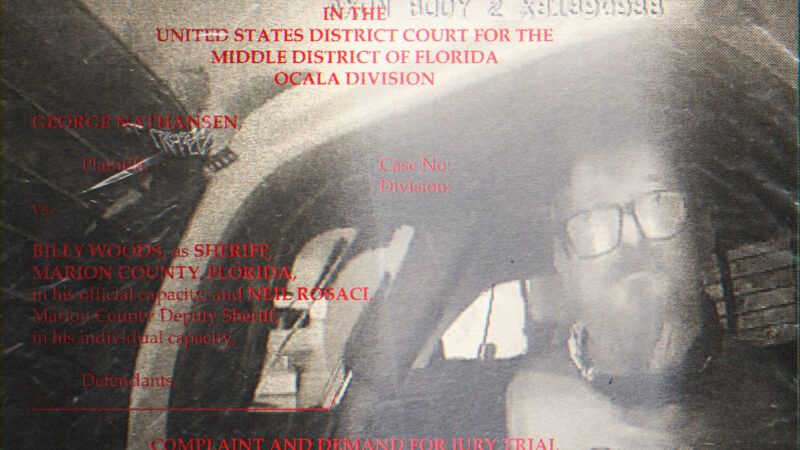A Florida Man Was Arrested for Filming Marion County Sheriff's Deputies. Now He's Suing.
Numerous federal appeals courts have ruled that filming police is protected under the First Amendment, but police continue to illegally arrest people for it.

A Florida man has filed a federal civil rights lawsuit three years after a Marion County sheriff's deputy arrested him for filming officers from a public sidewalk.
In 2021, Marion County Sheriff's Deputy Neil Rosaci arrested George Nathansen and charged him with obstruction of justice for refusing to follow his orders to leave the scene of an investigation. However, body camera footage showed Nathansen standing at least 30 feet away on a public sidewalk before Rosaci walked over and handcuffed him.
In Nathansen's lawsuit, filed last Friday in the U.S. District Court for the Middle District of Florida, he alleges that Rosaci and the Marion County Sheriff's Office (MCSO) violated his Fourth Amendment and Fourteenth Amendment rights by falsely arresting and incarcerating him.
Numerous federal appeals courts have ruled that filming the police is protected under the First Amendment, but police around the country continue to illegally arrest people for it. The Justice Department released a report this month on pervasive civil rights violations by the Phoenix Police Department, including retaliating against citizens who were trying to record them. Earlier this year, Texas prosecutors dropped charges against a citizen journalist who was arrested, strip-searched, and jailed for filming police.
Nathansen's case is yet another example of police retaliation against someone for core First Amendment activities.
The incident began on July 24, 2021, when Rosaci arrived at the scene of a car crash. While deputies were talking to the two parties involved in the accident, Nathansen arrived and began filming with his cell phone. There are a growing number of self-styled "First Amendment auditors" around the country who record police interactions and post them online. (In response to alleged harassment, several states have passed dubious "buffer-zone" laws that criminalize being too close to a first responder.)
Rosaci's body camera footage, obtained by the Ocala Post, showed that Nathansen was filming near the deputies' cars when Rosaci first shooed him away and told him, "You can stand on the sidewalk over there."
A couple minutes later, Nathansen wandered over to a bench, away from the deputies, where several of the occupants of one of the cars involved in the crash were sitting. Rosaci returned and physically forced Nathansen back onto the sidewalk, warning him that if he interfered again he would be arrested. Nathansen has a disability that inhibits his ability to speak and requires him to use an artificial larynx.
Rosaci and another deputy at the scene mentioned that they'd seen Nathansen before. "He's the one that's trying to start that YouTube channel," the other deputy griped.
Nathansen milled around on the sidewalk, walking back a few steps and then taking another few steps toward the deputies before stopping.
"Sir, do not step back over here again," Rosaci said after Nathansen had stopped. "I'm telling you if you come back in our vicinity I will take you to jail. Step back, step back."
Nathansen did not step back, but instead motioned at the sidewalk. Rosaci walked up to him and handcuffed him.
Watch the full body camera video here:
Nathansen repeatedly asked for a supervisor at the scene, but was refused.
A month later, after the MCSO released the body camera footage, the local state's attorney dropped the charges against Nathansen, saying in a statement to the Ocala Post that, "After review of the body cam video, the actions of the defendant do not support prosecution of the charge."
Nathansen's lawsuit seeks compensatory damages and attorney fees.
The MCSO declined to comment on Nathansen's lawsuit.


Show Comments (31)